formerly eScholarship Editions


|
|
|
|
Your search for
'Russian and Eastern European Studies' in subject
found 43 book(s). | Modify Search | Displaying 21 - 40 of 43 book(s) | |
| 21. | 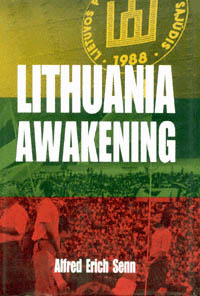 | Title: Lithuania awakening Author: Senn, Alfred Erich Published: University of California Press, 1990 Subjects: History | European History | Politics | Russian and Eastern European Studies Publisher's Description: Mikhail Gorbachev's policy of perestroika released new forces throughout Soviet society. In Lithuania this process resulted in a psychological-cultural revolution. Deep-rooted feelings, long suppressed, exploded, demonstrations and mass meetings ensued, and the face of the society changed. Although at the beginning of 1988 Lithuania appeared to be one of the relatively conservative republics in the Soviet Union, by the end of the year it stood among the leaders in pushing change. By 1990, Lithuania was even forcing Moscow to respond to its initiatives for independence and economic reform.Is Lithuania the prototype of a nation emerging from the collectivity of the Soviet Union? Alfred Erich Senn, who was present during most of this piece of history in the making, believes that it may be. He documents the dramatic events and changes in Lithuania during 1988 with the perspective of a historian and the immediacy of a participant.The reader will easily grasp the whole spectrum of political activity in Lithuania, and the range from right to left among Lithuanian activists. And, because the Lithuanians have emerged among the leaders of change in the Soviet Union, Senn's account provides a key to later developments, in terms of both political movements and political personalities. [brief] Similar Items |
| 22. | 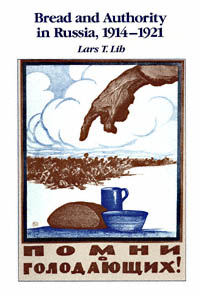 | Title: Bread and authority in Russia, 1914-1921 Author: Lih, Lars T Published: University of California Press, 1990 Subjects: History | European History | Politics | Russian and Eastern European Studies Publisher's Description: Between 1914 and 1921, Russia experienced a national crisis that destroyed the tsarist state and led to the establishment of the new Bolshevik order. During this period of war, revolution, and civil war, there was a food-supply crisis. Although Russia was one of the world's major grain exporters, the country was no longer capable of feeding its own people. The hunger of the urban workers increased the pace of revolutionary events in 1917 and 1918, and the food-supply policy during the civil war became the most detested symbol of the hardships imposed by the Bolsheviks.Focusing on this crisis, Lars Lih examines the fundamental process of political and social breakdown and reconstitution. He argues that this seven-year period is the key to understanding the Russian revolution and its aftermath. In 1921 the Bolsheviks rejected the food-supply policy established during the civil war; sixty-five years later, Mikhail Gorbachev made this change of policy a symbol of perestroika. Since then, more attention has been given both in the West and in the Soviet Union to the early years of the revolution as one source of the tragedies of Stalinist oppression.Lih's argument is based on a great variety of source material - archives, memoirs, novels, political rhetoric, pamphlets, and propoganda posters. His new study will be read with profit by all who are interested in the drama of the Russian revolution, the roots of both Stalinism and anti-Stalin reform, and more generally in a new way of understanding the effects of social and political breakdown. [brief] Similar Items |
| 23. | 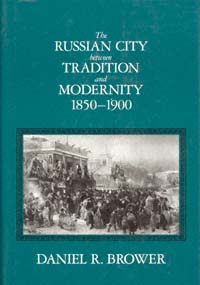 | Title: The Russian city between tradition and modernity, 1850-1900 Author: Brower, Daniel R Published: University of California Press, 1990 Subjects: History | European History | Russian and Eastern European Studies | Urban Studies Publisher's Description: The Russian City Between Tradition and Modernity provides a comprehensive history of urban development in European Russia during the last half of the nineteenth century. Using both statistical perspectives on urbanization and cultural representations of the city, Brower constructs a synthetic view of the remaking of urban Russia. He argues that the reformed municipalities succeeded in creating an embryonic civil society among the urban elite but failed to fashion a unified, orderly city. By the end of the century, the cities confronted social disorder of a magnitude that resembled latent civil war.Drawing on a wide range of archival and published sources, including census materials and reports from municipal leaders and tsarist officials, Brower offers a new approach to the social history of Russia. The author emphasizes the impact of the massive influx of migrants on the country's urban centers, whose presence dominated the social landscape of the city. He outlines the array of practices by which the migrant laborers adapted to urban living and stresses the cultural barriers that isolated them from the well-to-do urban population. Brower suggests that future scholarship should pay particular attention to the duality between the sweeping visions of social progress of the elite and the unique practices of the urban workforce. This contradiction, he argues, offers a key explanation for the social instability of imperial Russia in the closing decades of the nineteenth century. [brief] Similar Items |
| 24. | 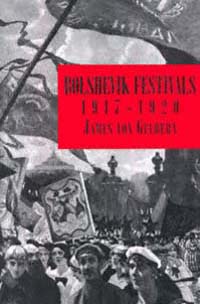 | Title: Bolshevik festivals, 1917-1920 Author: Von Geldern, James Published: University of California Press, 1993 Subjects: History | European History | European Literature | Russian and Eastern European Studies Publisher's Description: In the early years of the USSR, socialist festivals - events entailing enormous expense and the deployment of thousands of people - were inaugurated by the Bolsheviks. Avant-garde canvases decorated the streets, workers marched, and elaborate mass spectacles were staged. Why, with a civil war raging and an economy in ruins, did the regime sponsor such spectacles?In this first comprehensive investigation of the way festivals helped build a new political culture, James von Geldern examines the mass spectacles that captured the Bolsheviks' historical vision. Spectacle directors borrowed from a tradition that included tsarist pomp, avant-garde theater, and popular celebrations. They transformed the ideology of revolution into a mythologized sequence of events that provided new foundations for the Bolsheviks' claim to power. [brief] Similar Items |
| 25. | 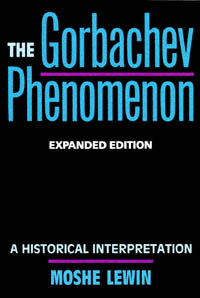 | Title: The Gorbachev phenomenon: a historical interpretation Author: Lewin, Moshe 1921- Published: University of California Press, 1991 Subjects: History | European History | Sociology | Politics | Russian and Eastern European Studies Publisher's Description: The "Gorbachev phenomenon" is seen as the product of complex developments during the last seventy years - developments that changed the Soviet Union from a primarily agrarian society into an urban, industrial one. Here, for the first time, a noted authority on Soviet society identifies the crucial h . . . [more] Similar Items |
| 26. | 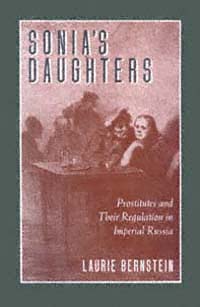 | Title: Sonia's daughters: prostitutes and their regulation in imperial Russia Author: Bernstein, Laurie Published: University of California Press, 1995 Subjects: History | European History | European Studies | Women's Studies | Russian and Eastern European Studies Publisher's Description: Prostitution in Imperial Russia was so tenacious that it survived not only the tsarist regime's most tumultuous years but the Bolshevik revolution itself. Laurie Bernstein's comprehensive study is the first to look at how the state and society responded to the issue of prostitution - the attitudes of prostitutes themselves, state regulation, societal reactions, and attempts at reform. She finds that prostitution and its regulation were integral to Russia's structures of gender, class, and politics.The first historian from outside the former Soviet Union to be granted access to these archival materials on prostitution, Bernstein takes the reader to the streets of Russia's cities, to the state-licensed brothels, medical clinics, hospital wards, halfway houses for "fallen women," and to the highest circles of the tsarist administration. [brief] Similar Items |
| 27. | 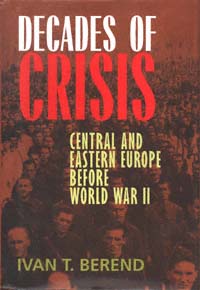 | Title: Decades of crisis: Central and Eastern Europe before World War II Author: Berend, T. Iván (Tibor Iván) 1930- Published: University of California Press, 1998 Subjects: History | European History | European Studies | Russian and Eastern European Studies | Economics and Business Publisher's Description: Only by understanding Central and Eastern Europe's turbulent history during the first half of the twentieth century can we hope to make sense of the conflicts and crises that have followed World War II and, after that, the collapse of Soviet-controlled state socialism. Ivan Berend looks closely at the fateful decades preceding World War II and at twelve countries whose absence from the roster of major players was enough in itself, he says, to precipitate much of the turmoil.As waves of modernization swept over Europe, the less developed countries on the periphery tried with little or no success to imitate Western capitalism and liberalism. Instead they remained, as Berend shows, rural, agrarian societies notable for the tenacious survival of feudal and aristocratic institutions. In that context of frustration and disappointment, rebellion was inevitable. Berend leads the reader skillfully through the maze of social, cultural, economic, and political changes in Hungary, Czechoslovakia, Yugoslavia, Poland, Romania, Bulgaria, Albania, Austria, Latvia, Lithuania, Estonia, and the Soviet Union, showing how every path ended in dictatorship and despotism by the start of World War II. [brief] Similar Items |
| 28. | 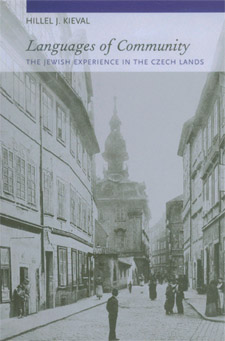 | Title: Languages of community: the Jewish experience in the Czech lands Author: Kieval, Hillel J Published: University of California Press, 2000 Subjects: Jewish Studies | European Studies | European History | Russian and Eastern European Studies | Judaism Publisher's Description: With a keen eye for revealing details, Hillel J. Kieval examines the contours and distinctive features of Jewish experience in the lands of Bohemia and Moravia (the present-day Czech Republic), from the late eighteenth to the late twentieth century. In the Czech lands, Kieval writes, Jews have felt the need constantly to define and articulate the nature of group identity, cultural loyalty, memory, and social cohesiveness, and the period of "modernizing" absolutism, which began in 1780, brought changes of enormous significance. From that time forward, new relationships with Gentile society and with the culture of the state blurred the traditional outlines of community and individual identity. Kieval navigates skillfully among histories and myths as well as demography, biography, culture, and politics, illuminating the maze of allegiances and alliances that have molded the Jewish experience during these 200 years. [brief] Similar Items |
| 29. | 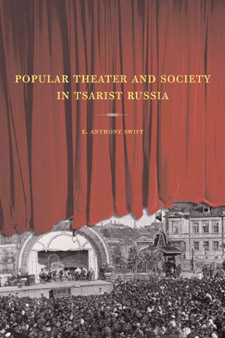 | Title: Popular theater and society in Tsarist Russia Author: Swift, Eugene Anthony Published: University of California Press, 2002 Subjects: History | European History | Russian and Eastern European Studies | Popular Culture | European Literature | European Studies Publisher's Description: This is the most comprehensive study available of the popular theater that developed during the last decades of tsarist Russia. Swift examines the origins and significance of the new "people's theaters" that were created for the lower classes in St. Petersburg and Moscow between 1861 and 1917. His extensively researched study, full of anecdotes from the theater world of the day, shows how these people's theaters became a major arena in which the cultural contests of late imperial Russia were played out and how they contributed to the emergence of an urban consumer culture during this period of rapid social and political change. Swift illuminates many aspects of the story of these popular theaters - the cultural politics and aesthetic ambitions of theater directors and actors, state censorship politics and their role in shaping the theatrical repertoire, and the theater as a vehicle for social and political reform. He looks at roots of the theaters, discusses specific theaters and performances, and explores in particular how popular audiences responded to the plays. [brief] Similar Items |
| 30. | 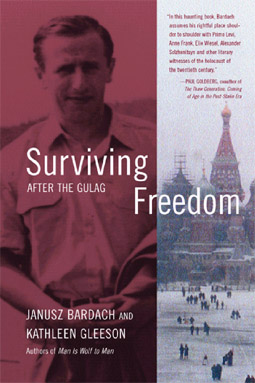 | Title: Surviving freedom: after the Gulag Author: Bardach, Janusz Published: University of California Press, 2003 Subjects: History | European Studies | Sociology | Politics | Russian and Eastern European Studies | Autobiography Publisher's Description: In 1941, as a Red Army soldier fighting the Nazis on the Belarussian front, Janusz Bardach was arrested, court-martialed, and sentenced to ten years of hard labor. Twenty-two years old, he had committed no crime. He was one of millions swept up in the reign of terror that Stalin perpetrated on his own people. In the critically acclaimed Man Is Wolf to Man, Bardach recounted his horrific experiences in the Kolyma labor camps in northeastern Siberia, the deadliest camps in Stalin's gulag system. In this sequel Bardach picks up the narrative in March 1946, when he was released. He traces his thousand-mile journey from the northeastern Siberian gold mines to Moscow in the period after the war, when the country was still in turmoil. He chronicles his reunion with his brother, a high-ranking diplomat in the Polish embassy in Moscow; his experiences as a medical student in the Stalinist Soviet Union; and his trip back to his hometown, where he confronts the shattering realization of the toll the war has taken, including the deaths of his wife, parents, and sister. In a trenchant exploration of loss, post-traumatic stress syndrome, and existential loneliness, Bardach plumbs his ordeal with honesty and compassion, affording a literary window into the soul of a Stalinist gulag survivor. Surviving Freedom is his moving account of how he rebuilt his life after tremendous hardship and personal loss. It is also a unique portrait of postwar Stalinist Moscow as seen through the eyes of a person who is both an insider and outsider. Bardach's journey from prisoner back to citizen and from labor camp to freedom is an inspiring tale of the universal human story of suffering and recovery. [brief] Similar Items |
| 31. | 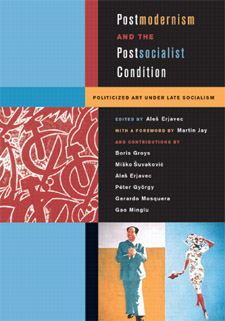 | Title: Postmodernism and the postsocialist condition: politicized art under late socialism Author: Erjavec, Aleš Published: University of California Press, 2003 Subjects: Art | Art History | Art Theory | Intellectual History | Russian and Eastern European Studies Publisher's Description: The Berlin Wall was coming down, the Soviet Union was dissolving, Communist China was well on its way down the capitalist path; the world was witnessing political and social transformations without precedent. Artists, seeing it all firsthand, responded with a revolution of their own. What form this revolution took - how artists in the 1980s marked their societies' traumatic transition from decaying socialism to an insecure future - emerges in this remarkable volume. With in-depth perspectives on art and artists in the former Soviet Union, the Balkans and Mitteleuropa, China, and Cuba - all from scholars and art critics who were players in the tumultuous cultural landscapes they describe - this stunningly illustrated collection captures a singular period in the history of world art, and a critical moment in the cultural and political transition from the last century to our own. Authors Ales Erjavec, Gao Minglu, Boris Groys, Péter György, Gerardo Mosquera, and Misko Suvakovic observe distinct national differences in artistic responses to the social and political challenges of the time. But their essays also reveal a clear pattern in the ways in which artists registered the exhaustion of the socialist vision and absorbed the influence of art movements such as constructivism, pop art, and conceptual art, as well as the provocations of western pop culture. Indebted to but not derived from capitalist postmodernism, the result was a unique version of postsocialist postmodernism, an artistic/political innovation clearly identified and illustrated for the first time in these pages. [brief] Similar Items |
| 32. | 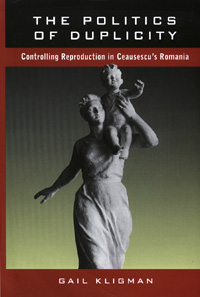 | Title: The politics of duplicity: controlling reproduction in Ceausescu's Romania Author: Kligman, Gail Published: University of California Press, 1998 Subjects: Sociology | Social Problems | Women's Studies | Russian and Eastern European Studies | European Studies | Politics Publisher's Description: The political hypocrisy and personal horrors of one of the most repressive anti-abortion regimes in history came to the world's attention soon after the fall of Romanian dictator Nicolae Ceausescu. Photographs of orphans with vacant eyes, sad faces, and wasted bodies circled the globe, as did alarming maternal mortality statistics and heart-breaking details of a devastating infant AIDS epidemic. Gail Kligman's chilling ethnography - of the state and of the politics of reproduction - is the first in-depth examination of this extreme case of political intervention into the most intimate aspects of everyday life.Ceausescu's reproductive policies, among which the banning of abortion was central, affected the physical and emotional well-being not only of individual men, women, children, and families but also of society as a whole. Sexuality, intimacy, and fertility control were fraught with fear, which permeated daily life and took a heavy moral toll as lying and dissimulation transformed both individuals and the state. This powerful study is based on moving interviews with women and physicians as well as on documentary and archival material. In addition to discussing the social implications and human costs of restrictive reproductive legislation, Kligman explores the means by which reproductive issues become embedded in national and international agendas. She concludes with a review of the lessons the rest of the world can learn from Romania's tragic experience. [brief] Similar Items |
| 33. | 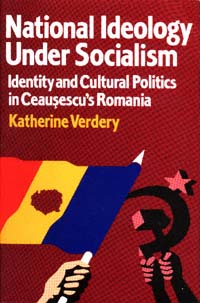 | Title: National ideology under socialism: identity and cultural politics in Ceauşescu's Romania Author: Verdery, Katherine Published: University of California Press, 1991 Subjects: Anthropology | Politics | Cultural Anthropology | European History | Russian and Eastern European Studies Publisher's Description: The current transformation of many Eastern European societies is impossible to understand without comprehending the intellectual struggles surrounding nationalism in the region. Anthropologist Katherine Verdery shows how the example of Romania suggests that current ethnic tensions come not from a re . . . [more] Similar Items |
| 34. | 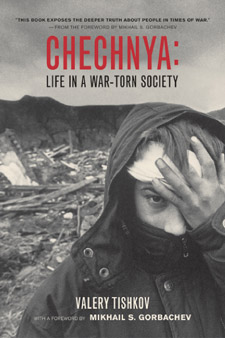 | Title: Chechnya: life in a war-torn society Author: Tishkov, Valeriĭ Aleksandrovich Published: University of California Press, 2004 Subjects: Anthropology | Ethnic Studies | European History | Sociology | Russian and Eastern European Studies Publisher's Description: This book illuminates one of the world's most troubled regions from a unique perspective - that of a prominent Russian intellectual. Valery Tishkov, a leading ethnographer who has also served in several important political posts, examines the evolution of the war in Chechnya that erupted in 1994, untangling the myths, the long-held resentments, and the ideological manipulations that have fueled the crisis. In particular, he explores the key themes of nationalism and violence that feed the turmoil there. Forceful, original, and timely, his study combines extensive interview material, historical perspectives, and deep local knowledge. Tishkov sheds light on Chechnya in particular and on how secessionist conflicts can escalate into violent conflagrations in general. With its balanced assessments of both Russian and Chechen perspectives, this book will be essential reading for people seeking to understand the role of Islamic fundamentalist nationalism in the contemporary world. [brief] Similar Items |
| 35. | 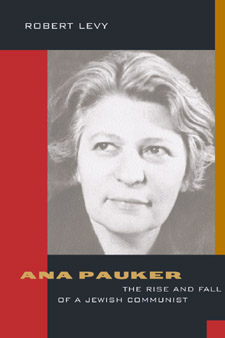 | Title: Ana Pauker: the rise and fall of a Jewish Communist Author: Levy, Robert 1957- Published: University of California Press, 2001 Subjects: History | Jewish Studies | Russian and Eastern European Studies | Politics | European History | Women's Studies Publisher's Description: In her own day, Ana Pauker was named "The Most Powerful Woman in the World" by Time magazine. Today, when she is remembered at all, she is thought of as the puppet of Soviet communism in Romania, blindly enforcing the most brutal and repressive Stalinist regime. Robert Levy's new biography changes the picture dramatically, revealing a woman of remarkable strength, dominated by conflict and contradiction far more than by dogmatism. Telling the story of Pauker's youth in an increasingly anti-Semitic environment, her commitment to a revolutionary career, and her rise in the Romanian Communist movement, Levy makes no attempt to whitewash Pauker's life and actions, but rather explores every contour of the complicated persona he found expressed in masses of newly accessible archival documents. [brief] Similar Items |
| 36. | 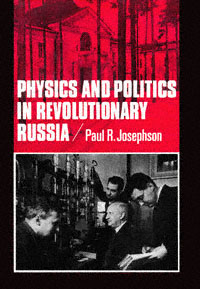 | Title: Physics and politics in revolutionary Russia Author: Josephson, Paul R Published: University of California Press, 1991 Subjects: History | History and Philosophy of Science | Russian and Eastern European Studies | Politics Publisher's Description: Aided by personal documents and institutional archives that were closed for decades, this book recounts the development of physics - or, more aptly, science under stress - in Soviet Russia up to World War II. Focusing on Leningrad, center of Soviet physics until the late 1930s, Josephson discusses the impact of scientific, cultural, and political revolution on physicists' research and professional aspirations.Political and social revolution in Russia threatened to confound the scientific revolution. Physicists eager to investigate new concepts of space, energy, light, and motion were forced to accommodate dialectical materialism and subordinate their interests to those of the state. They ultimately faced Stalinist purges and the shift of physics leadership to Moscow. This account of scientists cut off from their Western colleagues reveals a little-known part of the history of modern physics. [brief] Similar Items |
| 37. | 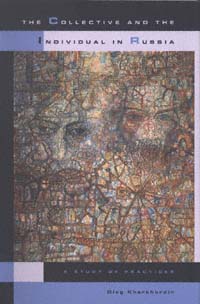 | Title: The collective and the individual in Russia: a study of practices Author: Kharkhordin, Oleg 1964- Published: University of California Press, 1999 Subjects: History | Social Theory | European History | Russian and Eastern European Studies | Intellectual History Publisher's Description: Oleg Kharkhordin has constructed a compelling, subtle, and complex genealogy of the Soviet individual that is as much about Michel Foucault as it is about Russia. Examining the period from the Russian Revolution to the fall of Gorbachev, Kharkhordin demonstrates that Party rituals - which forced each Communist to reflect intensely and repeatedly on his or her "self," an entirely novel experience for many of them - had their antecedents in the Orthodox Christian practices of doing penance in the public gaze. Individualization in Soviet Russia occurred through the intensification of these public penitential practices rather than the private confessional practices that are characteristic of Western Christianity. He also finds that objectification of the individual in Russia relied on practices of mutual surveillance among peers, rather than on the hierarchical surveillance of subordinates by superiors that characterized the West. The implications of this book expand well beyond its brilliant analysis of the connection between Bolshevism and Eastern Orthodoxy to shed light on many questions about the nature of Russian society and culture. [brief] Similar Items |
| 38. | 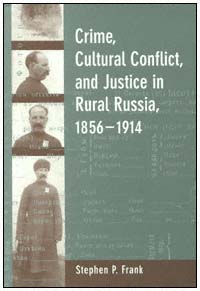 | Title: Crime, cultural conflict, and justice in rural Russia, 1856-1914 Author: Frank, Stephen 1955- Published: University of California Press, 1999 Subjects: History | Russian and Eastern European Studies | Cultural Anthropology | Social Problems | European History | Law | Criminology Publisher's Description: This book is the first to explore the largely unknown world of rural crime and justice in post-emancipation Imperial Russia. Drawing upon previously untapped provincial archives and a wealth of other neglected primary material, Stephen P. Frank offers a major reassessment of the interactions between peasantry and the state in the decades leading up to World War I. Viewing crime and punishment as contested metaphors about social order, his revisionist study documents the varied understandings of criminality and justice that underlay deep conflicts in Russian society, and it contrasts official and elite representations of rural criminality - and of peasants - with the realities of everyday crime at the village level. [brief] Similar Items |
| 39. | 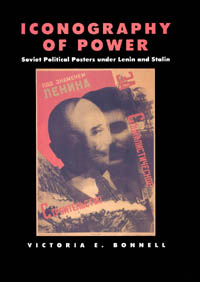 | Title: Iconography of power: Soviet political posters under Lenin and Stalin Author: Bonnell, Victoria E Published: University of California Press, 1998 Subjects: Sociology | Popular Culture | European Studies | Russian and Eastern European Studies | Politics | Art Criticism | History | European History Publisher's Description: Masters at visual propaganda, the Bolsheviks produced thousands of vivid and compelling posters after they seized power in October 1917. Intended for a semi-literate population that was accustomed to the rich visual legacy of the Russian autocracy and the Orthodox Church, political posters came to occupy a central place in the regime's effort to imprint itself on the hearts and minds of the people and to remold them into the new Soviet women and men. In this first sociological study of Soviet political posters, Victoria Bonnell analyzes the shifts that took place in the images, messages, styles, and functions of political art from 1917 to 1953. Everyone who lived in Russia after the October revolution had some familiarity with stock images of the male worker, the great communist leaders, the collective farm woman, the capitalist, and others. These were the new icons' standardized images that depicted Bolshevik heroes and their adversaries in accordance with a fixed pattern. Like other "invented traditions" of the modern age, iconographic images in propaganda art were relentlessly repeated, bringing together Bolshevik ideology and traditional mythologies of pre-Revolutionary Russia. Symbols and emblems featured in Soviet posters of the Civil War and the 1920s gave visual meaning to the Bolshevik worldview dominated by the concept of class. Beginning in the 1930s, visual propaganda became more prescriptive, providing models for the appearance, demeanor, and conduct of the new social types, both positive and negative. Political art also conveyed important messages about the sacred center of the regime which evolved during the 1930s from the celebration of the heroic proletariat to the deification of Stalin. Treating propaganda images as part of a particular visual language, Bonnell shows how people "read" them - relying on their habits of seeing and interpreting folk, religious, commercial, and political art (both before and after 1917) as well as the fine art traditions of Russia and the West. Drawing on monumental sculpture and holiday displays as well as posters, the study traces the way Soviet propaganda art shaped the mentality of the Russian people (the legacy is present even today) and was itself shaped by popular attitudes and assumptions. Iconography of Power includes posters dating from the final decades of the old regime to the death of Stalin, located by the author in Russian, American, and English libraries and archives. One hundred exceptionally striking posters are reproduced in the book, many of them never before published. Bonnell places these posters in a historical context and provides a provocative account of the evolution of the visual discourse on power in Soviet Russia. [brief] Similar Items |
| 40. | 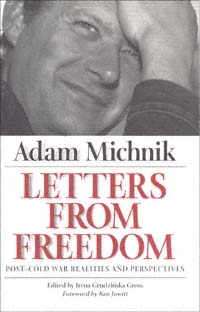 | Title: Letters from freedom: post-cold war realities and perspectives Author: Michnik, Adam Published: University of California Press, 1998 Subjects: History | Politics | Russian and Eastern European Studies | Social and Political Thought | European History | Intellectual History Publisher's Description: A hero to many, Polish writer Adam Michnik ranks among today's most fearless and persuasive public figures. His imprisonment by Poland's military regime in the 1980s did nothing to quench his outpouring of writings, many of which were published in English as Letters from Prison . Beginning where that volume ended, Letters from Freedom finds Michnik briefly in prison at the height of the "cold civil war" between authorities and citizens in Poland, then released. Through his continuing essays, articles, and interviews, the reader can follow all the momentous changes of the last decade in Poland and East-Central Europe. Some of the writings have appeared in English in various publications; most are translated here for the first time.Michnik is never detached. His belief that people can get what they want without hatred and violence has always translated into action, and his actions, particularly the activity of writing, have required his contemporaries to think seriously about what it is they want. His commitment to freedom is absolute, but neither wild-eyed nor humorless; with a characteristic combination of idealism and pragmatism, Michnik says, "In the end, politics is the art of foreseeing and implementing the possible."Michnik's blend of conviction and political acumen is perhaps most vividly revealed in the interviews transcribed in the book, whether he is the subject of the interview or is conducting a conversation with Czeslaw Milosz, Vacláv Havel, or Wojciech Jaruzelski. These face-to-face exchanges tell more about the forces at work in contemporary Eastern Europe than could any textbook. Sharing Michnik's intellectual journey through a tumultuous era, we touch on all the subjects important to him in this wide-ranging collection and find they have importance for everyone who values conscience and responsibility. In the words of Jonathan Schell, "Michnik is one of those who bring honor to the last two decades of the twentieth century." [brief] Similar Items |